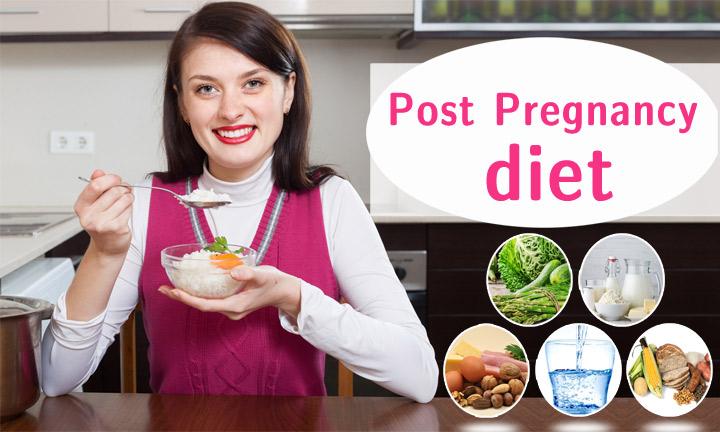
Here is a concise list of what to definitely include in your diet for at least three months after delivery
Expecting a beautiful, bonny baby soon? That’s great! Going through 36-40 weeks of pregnancy and the life-altering process of labour would permanently change you – and you will love it! At the end of it all, you will become a mother!
And it is now that you will realize how very important it is to take care of yourself. Once you become a mother, your natural instinct is to put your baby’s needs above yours in everything. If you run a fever, you will worry about giving it to your baby, even if you have some strange habits, you will fear passing them to the baby!
So if, right now, you are worrying about what you should & what not to include in your after pregnancy diet, you are on the right track.
Post Pregnancy Diet: What to Eat
The basic diet for a new mother sounds like the same old tape playing over and over again; you’ve been hearing it ever since that fateful day you announced your pregnancy. But it is never too much to hear good advice, so read on to know more about your ideal post pregnancy diet:
1. Hydration:
Very important for breast feeding mothers! The baby absorbs a huge quantity of water from you and might leave you dehydrated. Optimum water intake in the form of fresh water, soups and fresh juices is essential for you.
2. Greens:
You can start eating a solid diet as soon as your doctor advises so. Make sure to include as many greens as possible in your diet after pregnancy. They are loaded not only with vitamins and minerals, but also anti-oxidants. Your body needs to regain its strength after delivery and green is definitely the way to go.
3. Proteins:
Most proteins are safe to eat post delivery. However, avoid eating too many meats as their heavy proteins can sometimes irritate the baby’s intestines (what you eat goes directly to your baby via breast milk). Eggs are safe, too, as long as you can digest them. Vegetarians can also load up on proteins by including paneer, curd, soya, tofu and dry fruits in their diet.
4. Milk Products:
Most women can tolerate milk and milk products post delivery. Milk products should be made from pasteurized milk, to avoid the risk of infection. Include lots of curd, paneer, cheese and have at least a litre of milk per day. Milk can be fortified with any supplement to give added strength.
5. Carbohydrates and Sugars:
If you are worried about losing weight, this is not the time. While breastfeeding, your body needs at least 300-400 extra calories every day. Including whole grain rotis, oats, bread and brown rice in the diet is essential. Also eat natural sugar as much as possible by consuming fresh fruits and fresh fruit juices.
6. Nuts:
Dried fruits are a staple of the Indian post pregnancy diet. Nuts are rich in minerals, proteins and Omega-3 fatty acids. Add panjeeri to your diet as it contains lots of nuts, ghee and carbohydrates. Consult with your doctor before eating them if you had a C-section. Otherwise, it is advisable to take a cup or small bowl of nuts every day.
Post Pregnancy Diet: What to avoid
Most foods are safe for a new breastfeeding mother. But remember, whatever you eat, you pass on to your baby through breast milk. That, and your gut instinct, will tell you what not to eat after delivery. Here are some major no-no foods that you need to steer clear when planning your after pregnancy diet plan.
1. Spicy Food:
Spicy food is primary thing to be avoided in your diet for post pregnancy. For the simple reason that spicy food will pass into your baby’s tender intestines and bloodstream, it should be avoided. The baby’s digestive tract is still very tender and can digest only simple breast milk. So, out off spicy food for at least the next 6 months.
2. Oily Food:
Too much oily food means you will store fat in your body and can be a hurdle in getting your old, fit body back. If you have hidden behind your new mommy glow, you will soon regret eating those parathas, ghee, and sweets. Shedding the kilos will become a horrid strain.
3. Don’t do the C-A-N:
Eliminate Caffeine, Alcohol and Nicotine entirely from your diet. If you think that you are pregnant no longer, think again, as long as you breastfeed, your baby is still part of your body. The three can cause diarrhoea, dehydration and colic in the baby.
4. Gas And Acidity Producing Foods:
Steer clear of foods that give you gas, acidity and belching as they are not good for your post delivery body and you baby’s tiny frame. Avoid:
5. Medications:
Never take any medication without consulting your gynaecologist or the baby’s paediatrician. The medications and its compounds will pass to your baby through breast milk. Even if you want to start a new multi-vitamin or antacid, always ask your doctor to prescribe a breastfeeding-friendly one.
Although all these do’s and don’ts seem pretty overwhelming, keep in mind that they are in the best interests of your body, and most importantly, your baby’s health. At this stage, a healthy and happy mum means a healthy and happy baby! Your body needs to return to its normal, healthy state because mommyhood takes a huge toll on physical and emotional health.
So, eat well while you breastfeed to gain enough strength for the next phases of motherhood challenges. Above all, having any more doubt about post pregnancy diet plan, trust your instincts and keep your doctor in the circle of trust.
